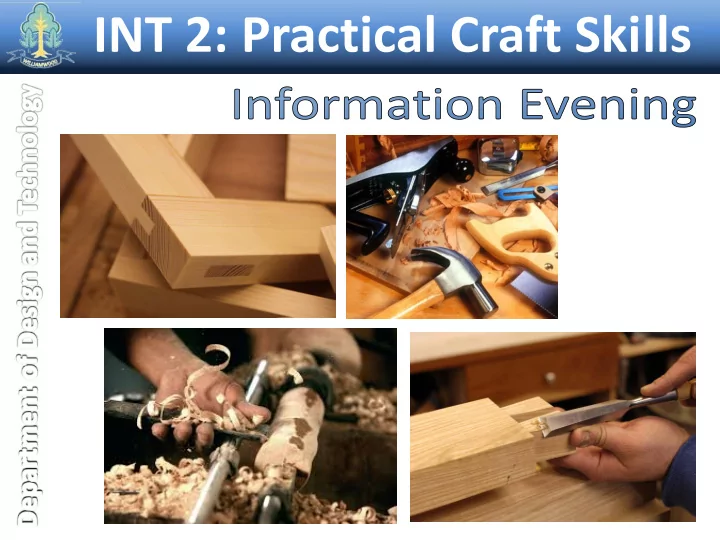

COURSE AIMS: This course: � fosters practical skills in the creation of artefacts � develops knowledge, understanding and skills of general aspects of practical woodworking activity � encourages independence and the ability to make choices � highlights the importance of safety and encourages responsible attitudes in the workshop environment � contributes to personal development, in particular to practical capability
Unit NABS: Pupils must complete all three mandatory units to pass the course. These are assessed on a pass/fail basis and are outlined below: 1. Bench Skills 1: Flat ‐ Frame Construction (40 Hours) 2. Bench Skills 2: Carcase Construction (40 Hours) 3. Machining and Finishing (40 Hours) At the end of each unit, there is a knowledge based test that asks pupils to answer questions related to woodworking materials, processes and tools used within that unit. These are also mandatory and complete the assessment for each unit. Pupils have revision notes and homework booklets to consolidate their learning and prepare for these tests. FINAL ASSESSMENT: The assessment is the pupils course examination. Note that there is no written paper in this course. The final assessment takes the form of a wall clock which contains elements from each of the mandatory units. Pupils are expected to complete this task independently using the knowledge and skill gained from previous units.
DESCRIPTION: Candidates will learn to use and maintain a range of common hand tools and be involved in setting out and making a range of basic joints which are commonly used in the production of flat ‐ frame joinery fabrications and structures. The candidate will then use the skills and knowledge gained from the production of joints to manufacture a framed product from a working drawing. This takes the form of a table mirror . The associated knowledge of tools, materials and processes is identified in the table below.
DESCRIPTION: The candidates will learn how to set out and make a range of basic joints that could be used in a wide range of carcase joinery construction. After completing candidates will begin work on the assessment, which is to manufacture a spice rack . This should include further study of the use and application of working drawings and the activities and skills listed in the table below. The associated knowledge of tools, materials and processes is identified in the table below.
DESCRIPTION: Candidates will learn to set up and use a range of common machine and power tools in accordance with safe working practice. Candidates will manufacture a machined component from a working drawing and will learn how to use various finishing techniques. This will include a range of surface preparations as listed in the table below. This takes the form of a kitchen roll holder . The associated knowledge of tools, materials and processes is identified in the table below.
DESCRIPTION: � As this course is predominantly practical in nature, the majority of the features contained within the additional 40 hours must also be practical. Hence the course assessment is based entirely on a practical project. It is anticipated that this project will require between 20 and 30 hours and be tackled near the end of the course. � The project allows integration of the knowledge, understanding and skills gained in the units of the course. � The project will be manufactured to a given working drawing. Candidates at this level will be expected to produce an outline plan of how the project is to be made. � Candidates will not be assessed on their ability to design a product, though designing should be encouraged and developed as part of effective teaching and learning and motivation. � The final assessment is graded from A – D.
DEADLINES: 1. Bench Skills 1 (Mirror): 14 th December 2012 2. Bench Skills 2 (Spice Rack): 11 th April 2013 Machining and Finishing (Kitchen Roll Holder): 15 th 3. November 2013 Final Assessment (Clock): 27 th 4. March 2014 Those pupils who have not completed the three mandatory units within the given deadlines, must do so in their own time. Supported study is available for this purpose. NO EXTENSION will be given for the Final Assessment.
Support within the department: The department runs supported study for Practical Craft Skills on a Wednesday and Friday lunchtime every week. We have an open door policy to allow pupils to come in for extra support and guidance within the subject. Testing and Revision: At the end of each unit pupils sit a written test on the skills, processes and tools used. The department provides revision packs and pupils are given weekly homework to help prepare for these.
Possible further study and career routes for students: apprenticeships and/or training in practical technology and related fields including: � Joinery. � Crafts � Construction. � Manufacturing. � Engineering. � Theatre. (Stage production) � Visual arts.
Recommend
More recommend